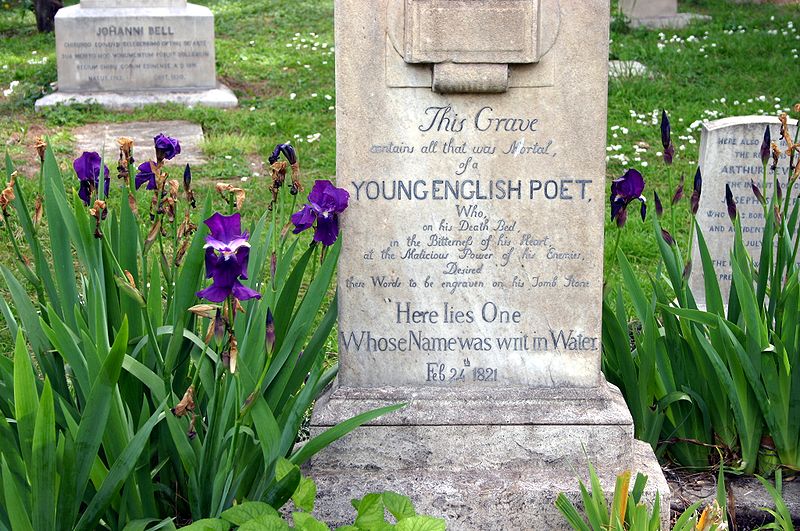
Piazza di Spagna: Giambattista Piranesi, 1748 (from Illustrations de Antichita Roma)

John Keats' last surviving letter to Fanny Brawne, August 1820
Black the hue of mourning robes still drapes the air
Over the Spanish Steps, till dawn slips on marble
Lions aboard Bernini's broken boat
A white cloth they wrap the dead in;
Through this pallor a pink of conch shells seeps,
Then blue flames consume the whole of heaven.
Noon blasted by bolts of brass and gold
Steeps my brain in a dreamful fever-sleep
Wherein I labor beating out the links
Of fate, link after link, an endless chain
Of sorrows and sweats and nervous tossings.
When I have the strength to prop myself up
Beside the window next, the air appears as
Corporeal tissue decomposing, like
Dusty carcasses of animals that hang
A week at market, darkening by degrees
From a faded terracotta red -- the color
Of the roofs of Rome still saturated
With the sun's warmth as the dying day cools
The pope's dome to a dark grape in lemon dusk
And with twilight one star lifts itself above
The city, pauses and plunges downward --
Into an overflowing well of
Violet, the shade of separation.

Protestant cemetery in Rome: John Keats' grave: photo by Giovanni Dall'Orto, 2008
The Protestant Cemetery in Rome: Walter Crane, 1873 (Keats' gravestone in foreground)




7 comments:
Ah, the poor Keats... coughing his life out far from home and yet still hyper-aware of beauty in that raw way... this is a fine portrait of him, I think.
Zeph,
Yes, one has to think that while the strength to write had long since departed him, that special sensitivity, the almost painful state of being "hyper-aware of beauty" as you call it, remained part of his nature to the end.
Of course it is always risky to try to project into the mind and feelings of another, especially someone in extremity as at this point Keats literally was.
As we know there have been some heart-wrenching evocations of his final days. But the one I like best is the one that perhaps overcompensates a bit by stressing the toughness and courage -- at least an antidote to the sentimental regard.
That would be Anthony Burgess's Abba Abba, an unusual and refreshing take on the JK of those last days. Burgess has him at one point forsaking poetry somewhat bitterly:
"It's all in decay, Severn. It was a clever machine, with the tongue and the teeth and the lips clacking and cooing most clever clusters of noises, and the noises long by common acceptance attached to things and thoughts eager to be juggled in pretty poesy. But at the end there is only this I, shapeless and without memory or intelligence unless I consign it elsewhere. So for the moment I join it to the I of that singing water in the piazza and lose even my name. Or, if you will, write that name on water and hear the water gurgle on uncaring singing I, I, I."
A fiction made out of a legend made out of a bit of gossip perhaps, but I've found Burgess's dying Keats curiously mature--and credible. And I do recall this little book bringing an odd sort of consolation, with its positing of a lost yet still brave Keats, to a poet friend, Edward Dorn, in his own terminal time. The passage to which he responded in particular was this:
"St Valentine's Day came, and with it Valentino Llanos to announce he would go to England soon. Then a week passed and two more days, and John knew his dying day had come, yet to achieve death might be a hard day's labour. Severn held him, as it were carrying him to the gate, but he could not bear Severn's laboured breathing, for it struck like ice. To put off the world outside -- the children's cries, snatches of song, a cheeping sparrow, the walls and the wallpaper and the chairs that thought they would outlast him but would not, the sunlight streaking the door -- was not over-difficult. A bigger problem was to separate himself from his body -- the hand worn to nothing, the lock of hair that fell into his eye, even the brain that scurried with thoughts and words and images. It took long hours to die."
Tom,
have you got a chance to preview the film BRIGHT STAR, by Jane Campion, about Fanny and John? I heard it was at Cannes?
-R
Ryan,
I haven't had a chance to see the film, but it has been approved by the astute critics T. Luddy and Zephirine.
Zeph sent along this:
Bright Star
Terrific poem, Tom. And I'm looking forward to the Keats movie, too.
When reading it aloud, the sounds are amazing. It is music.
Great poem.
And now I want to see the film!
And now, forgive me, I want to hear the poem read aloud by you.
Post a Comment